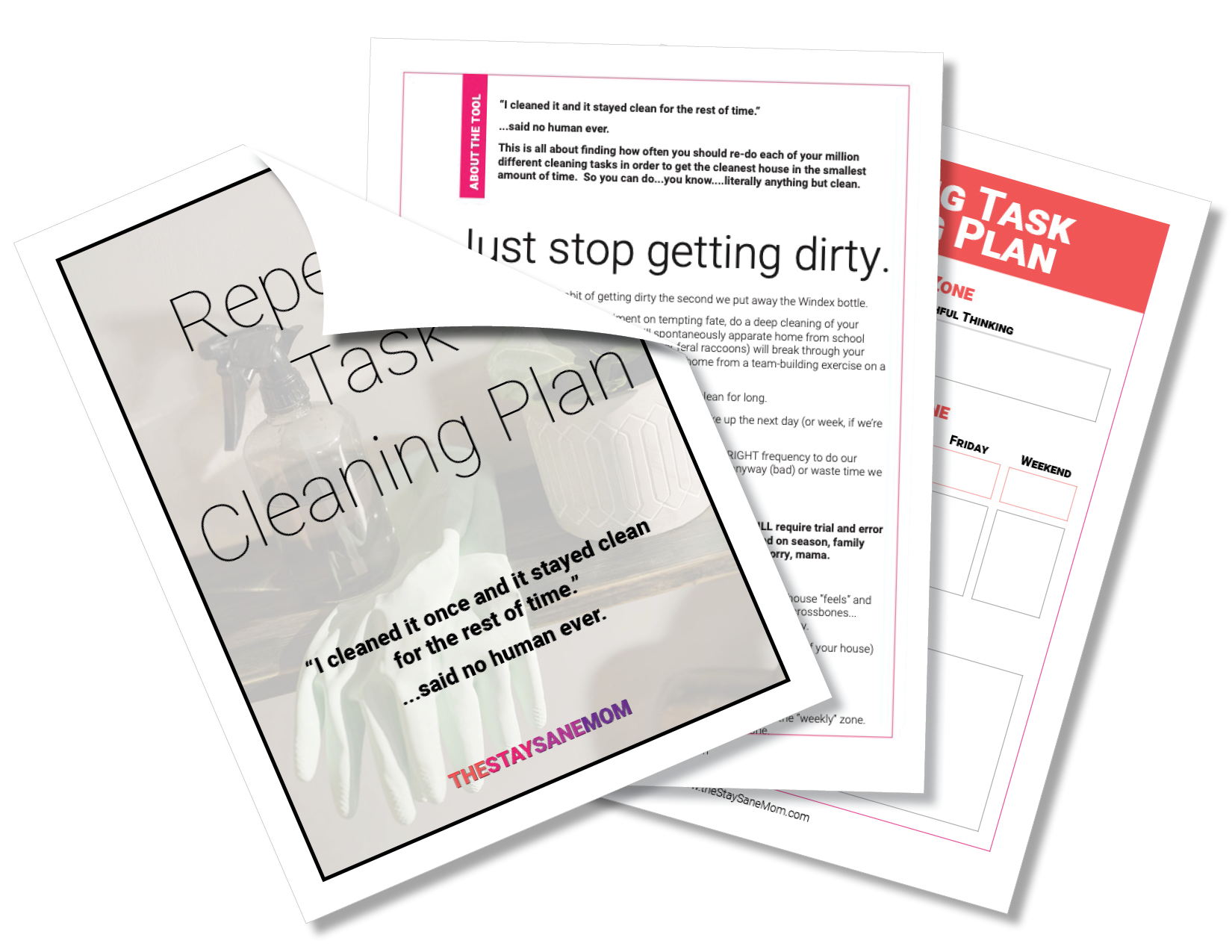10 Tips for Stress-Free Home Renovations

10 Tips for Stress-Free Home Renovations
Here are ten things that you can do to make the renovation process a little more bearable.
Written by The Stay Sane Mom Staff | See Comments | Updated 05/18/2019
Want to cut to the chase?
Repeating Item Cleaning Plan

10 Tips for Stress-Free Home Renovations
This post contains some affiliate links for your convenience. Click here to read my full disclosure policy.
Anyone who has ever caught it themselves knows how difficult the remodeling bug can be to shake.
Typical symptoms include mooning over Pinterest, collecting wallpaper samples, and daydreaming of hardwood flooring, bay windows, and more.
Renovating your home is a rewarding process that can be fun and exciting for the entire family. However, that doesn’t mean that it’s easy. In fact, no matter the size of your project, there will be a lot of stress caused.
With that in mind, here are ten things that you can do to make the process a little more bearable.
Tip #1: Take A Look Around
Before rushing into remodeling your house, you should take a look around the place.
By evaluating your home’s condition, you get a better idea of how much work really needs carrying out.
While you walk around the house, be sure to write down things you don’t like or wish to improve. You should also consider why you want to remodel your home, to begin with. This can give you an idea of home improvement projects you should include in the renovation plan too.
Tip #2: Set A Rough Budget
Unless you have an unlimited supply of money, your project is going to need a budget.
This is especially important if you plan to borrow. There are many lending options that you could consider, such as small loans from loved ones or secured joint loans from Evolution Money.
If you’d rather not owe any money, then you should begin to cut costs around the house to save up. Another great way to do it is to make a prioritized list of your desired renovations, put aside a small amount of money each month, and tackle your list item by item as your “renovation fund” grows big enough to tackle the next item on your list.
Once you have your budget, relay it to your contractor so that you don’t overspend.
Tip #3: Know What Is Realistic
Every project carried out in your home will come with a price tag.
For this reason, you need to be realistic about how far your money is going to go. You may have big plans for your property, but, if you don’t have the funds, then you might need to sacrifice a few additions or upgrades (or wait until you have the money).
This is why it’s so important that you don’t get your heart set on any plans until you’ve looked at your finances and spoken to a professional. You may find yourself disappointed otherwise.
Tip #4: Find The Right Contractor
There are some home improvements that homeowners can typically carry out themselves, but more difficult works should be left to the professionals.
This means that you’re going to need to hire a contractor.
CAUTION: A bad contractor can make you want to burn down your house instead of completing the renovations. We had a bad contractor when we initially moved into our house and the job was finished sloppily, over budget, and late. I didn’t even know that was possible.
Seriously, save yourself the future agony and do your research ahead of time.
Rather than book the first one you find, you should spend some time researching and comparing a few different options. You must always ask builders to provide references and proof of permits, and, if they’re trustworthy, they should be able to do so easily.
Give them clear guidelines, due dates, and consequences (financial ones) for if they miss a deadline.
Tip #5: Choose The Best Time
The very last thing that you should do is plan a renovation during an already stressful or busy time for your family. This will cause more disruption and put everyone on edge.
Because of this, you should avoid exam season and busy work periods. The summer is usually the best time to carry out renovations, as the kids aren’t at school, and you might have some vacation days that you can use.
This means that you can all go out or go away if the mess and noise get too much.
Tip #6: Make All Decisions First
Before you allow work to commence, you should ensure that all home improvement decisions have been made.
You’ve probably planned all of the big stuff, but you should also be sure of the fittings, fixtures, and finishes, as well as any other minor details. When works first begin, they can progress quite quickly. This means that, if there are still decisions to be made, you could face delays. You might also make a choice in the heat of the moment that you regret later on.
Tip #7: Let Your Neighbours Know
As disruptive as your remodel is for you, it can be just as stressful for your neighbors.
After all, they only live next door, so will be able to hear all the noise and see all of the mess just like you can. Because of this, you should let them know about the improvements being carried out in your home. You don’t need to go into details, but you should provide a rough timeline.
This saves you from any arguments that might have occurred if you’d sprung the renovation on them.
(Also, if you live in an area with a homeowner’s association, don’t neglect to get your renovations approved. You definitely don’t want to get halfway through a project only to get in trouble with the powers that be and have to stop or postpone the job.)
Tip #8: Ready The House Ready
Dirt and mess are unavoidable consequences of home improvements.
However, that doesn’t mean that all of your belongings need to be ruined in the process of remodeling. By preparing your house before contractors arrive, you can protect your home and all its contents.
All you need to do is remove everything that you can and cover up the things that you can’t.
Speak to contractors so that you know which rooms you’ll need to prepare for them on which days.
Tip #9: Move The Family Out
The simplest way to save yourself from the stress of a renovation is to remove your family from the situation.
This means moving out until the works are completed.
If you have pets or small children, this decision will take them out of harm's way. Some people choose to stay with loved ones, others head to a hotel, and some even take the opportunity to go on vacation. Whatever you decide to do, you should let the contractor know about your plans before works start.
Also, don’t forget to factor in the costs of being gone when you do your initial budget.
Tip #10: Prepare For The Unexpected
No matter how well you plan your remodel, there is always the chance that something will go wrong.
More often than not, this will leave you with a cost that you didn’t budget for, putting your finances at risk. Instead of facing these problems when they come, you should prepare for them now by adding an emergency fund to your budget. You may not need to use this, of course, but, if you do, it can save a lot of worry knowing you already have funds available.
Home improvements can cause a lot of stress, but, with the advice above, you can make the process of remodeling your home a lot easier to bear.
Start Your Next Step
Repeating Item Cleaning Plan

Get Sanity, Delivered to Your Inbox.
Care to Share?




About the Author

The Stay Sane Mom Staff
Contributor
Occasionally we post blogs that are a team effort from The Stay Sane Mom staff. Fear not, these are still up to our quality standards, they just don't come from any one person (rather the team at large). As my 4-year-old says, teamwork makes the dream work.




